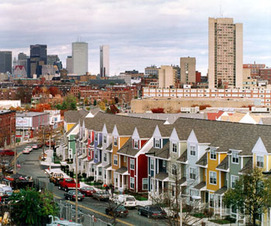Housing

The lack of affordable housing can produce instability for families and neighborhoods, and create barriers to employment and educational opportunities. Critics argue that public housing concentrates poverty so recent U.S. housing policy has pursued strategies to create mixed-income communities. However, relatively little work has evaluated the effects of this policy on former residents. My research seeks to understand how public housing residents perceive the redevelopment of their homes. In addition, I study how “mixed-income” is defined, who is included in mixed-income communities, and what this means for families who are left out.
Education |

Access to higher education is crucial for supporting individual economic mobility and sustainable urban areas. However, many low-income students do not obtain a college degree. The conventional view is that disadvantaged students cannot afford college or they are academically underprepared, but prior work shows this cannot account for gaps in college participation. My research examines new explanations for low rates of college entry and degree completion among low-income students: institutional quality, non-cognitive skills, and information. Using multivariate analysis, GIS mapping, and interviews, I show these factors have a significant impact on the chance of going to college and finishing a degree.
